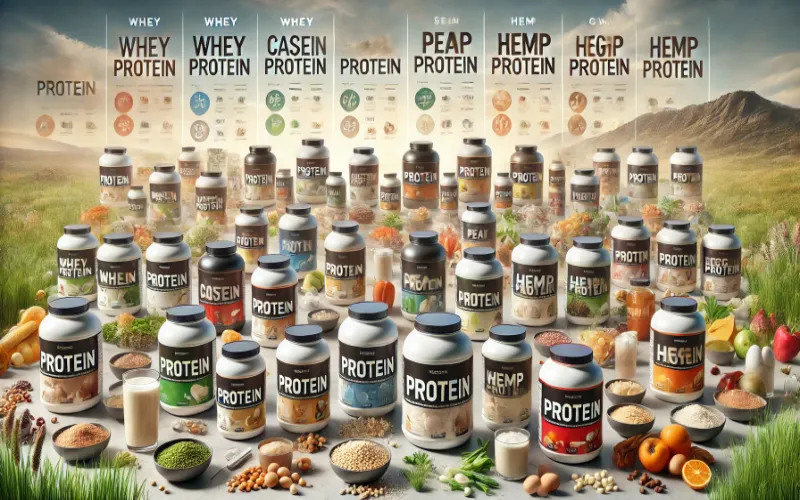In the intricate tapestry of fitness and nutrition, protein supplements have established themselves as indispensable tools for achieving diverse health and performance goals. As the building blocks of muscle, enzymes, and hormones, proteins are vital for myriad bodily functions. Yet, despite the abundance of protein-rich foods available, modern lifestyles and specific fitness goals often necessitate supplementation to ensure optimal intake.
Whether you are an athlete striving for muscle hypertrophy or an individual seeking to enhance your nutritional balance, protein supplements offer a pragmatic solution to meet your dietary needs. However, the sheer variety of supplements on the market can be overwhelming, making it crucial to understand the unique properties and benefits of each type. This knowledge empowers you to make informed choices that align with your specific goals, whether they involve boosting athletic performance, managing weight, or improving overall well-being.
Elevate your nutrition and fuel your day with the power of whey protein—try it in your next smoothie for a delicious boost that supports your health and fitness goals!

Whey Protein: The Popular Choice
Among the vast array of protein supplements available, whey protein has earned its status as a staple in the fitness community.
Derived from the liquid portion of milk that separates during cheese production, whey protein is celebrated for its rapid absorption and complete amino acid profile, which includes all nine essential amino acids that the body cannot produce on its own. This makes whey an excellent option for those seeking to maximize muscle protein synthesis—a process crucial for muscle growth and recovery.
- The appeal of whey protein extends beyond its nutritional benefits. Its versatility is another reason for its widespread popularity. Whey protein powder can be effortlessly incorporated into a variety of dietary routines.
- Whether mixed into a post-workout shake, stirred into oatmeal, or even used as an ingredient in high-protein baked goods, whey offers a convenient and palatable way to boost protein intake.
- Additionally, the quick absorption rate of whey protein makes it particularly effective when consumed immediately after intense exercise, a time when the body is most receptive to nutrient uptake and muscle repair.
- This combination of nutritional efficacy, versatility, and convenience makes whey protein a preferred choice for both seasoned athletes and fitness enthusiasts alike.
Casein Protein: Slow and Steady
In contrast to the rapid action of whey, casein protein offers a more gradual and sustained release of amino acids, earning it the moniker of the “slow and steady” protein.
- Also derived from milk, casein forms a gel-like substance in the stomach, which slows down the digestion process.
- This slow digestion rate provides a prolonged release of nutrients, making casein an ideal choice for those looking to maintain a steady supply of amino acids over an extended period.
One of the most strategic times to consume casein protein is before bedtime. During sleep, the body undergoes significant repair and recovery processes, particularly in the muscles. By consuming casein before sleep, you can ensure a continuous delivery of amino acids to support these nocturnal recovery processes, effectively reducing muscle breakdown and promoting muscle growth. This makes casein a valuable addition to the supplement regimen of those focused on muscle preservation and recovery.
Beyond its functional benefits, casein protein is also appreciated for its satiating properties. The slow digestion not only supports prolonged muscle repair but also helps in managing appetite, making it a useful tool for those aiming to control hunger and avoid late-night snacking.
Soy Protein: Plant-Based Power
In the landscape of plant-based proteins, soy protein stands as a titan, offering a robust alternative to animal-derived supplements.
- Extracted from soybeans, soy protein is not just a substitute; it is a powerful, nutrient-dense option in its own right. What sets soy apart is its complete amino acid profile—a rarity among plant-based proteins.
- This means that it provides all nine essential amino acids necessary for protein synthesis, muscle repair, and overall health, making it a viable choice for those seeking to build or maintain muscle mass.
However, the benefits of soy protein extend far beyond muscle-building. Research has shown that soy protein can play a significant role in reducing cholesterol levels and supporting cardiovascular health. Soy contains isoflavones, which are plant compounds that have been found to have cholesterol-lowering effects and may help improve blood vessel function. This makes soy protein an attractive option not just for athletes but for anyone looking to enhance heart health.
Remember!
For those who are lactose intolerant or follow a vegetarian or vegan diet, soy protein offers a reliable and nutritionally complete alternative to dairy-based proteins like whey and casein. Its versatility allows it to be used in a variety of forms—powder, tofu, tempeh, and more—making it easier to incorporate into daily meals. The adaptability of soy protein in both sweet and savory dishes further cements its place as a cornerstone of plant-based nutrition.
Pea Protein: The Vegan Alternative
As the demand for vegan and hypoallergenic protein options grows, pea protein has emerged as a popular choice among health-conscious individuals.
- Derived from yellow split peas, pea protein is celebrated for its hypoallergenic nature, making it an excellent option for those with sensitivities to common allergens like dairy, soy, and gluten.
- This accessibility ensures that a broader audience can reap the benefits of protein supplementation without the risk of adverse reactions.
One of the key highlights of pea protein is its richness in branched-chain amino acids (BCAAs), particularly leucine, which plays a crucial role in muscle protein synthesis.
- This makes pea protein an effective supplement for promoting muscle growth and recovery, particularly for those engaged in resistance training or other high-intensity exercises.
- Despite being plant-based, pea protein provides a respectable amount of all essential amino acids, making it a strong contender for those seeking to build or maintain muscle mass.
- Pea protein’s natural taste and smooth texture make it a versatile ingredient in various culinary preparations.
- Whether blended into smoothies, mixed into oatmeal, or used as a base for protein bars, pea protein seamlessly integrates into a wide range of dietary routines.
- Its adaptability, combined with its nutritional profile, makes pea protein a valuable addition to any vegan or allergen-free diet.
Hemp Protein: Nutrient-Rich Source
Hemp protein is a unique player in the protein supplement market, offering more than just muscle-building capabilities.
- Sourced from hemp seeds, this protein is not only rich in protein content but is also a nutritional powerhouse that provides a wide array of health benefits.
- Hemp protein is packed with omega-3 and omega-6 fatty acids, which are essential for maintaining heart health, reducing inflammation, and supporting brain function.
In addition to its healthy fats, hemp protein is also a great source of fiber, which aids in digestion and helps maintain healthy blood sugar levels. This makes it particularly beneficial for those who are looking to improve their digestive health while also increasing their protein intake. The presence of essential minerals such as magnesium, iron, and zinc further enhances the nutritional value of hemp protein, making it a well-rounded supplement that supports overall health and well-being.
The slightly nutty flavor of hemp protein adds a pleasant taste to smoothies, cereals, and baked goods, making it easy to incorporate into your diet. Its nutrient density, combined with its natural and unprocessed nature, makes hemp protein a top choice for those who prioritize both health and sustainability in their nutrition.
Rice Protein: Gentle on Digestion
For individuals with multiple allergies or sensitivities, rice protein emerges as a gentle and effective option.
- Extracted from brown rice, this protein supplement is known for being hypoallergenic, meaning it is unlikely to cause allergic reactions or digestive discomfort.
- This makes rice protein an ideal choice for those with sensitivities to common protein sources like dairy, soy, and gluten.
While rice protein may not have the complete amino acid profile found in other protein sources, it still offers a respectable amount of essential amino acids, particularly when combined with other plant-based proteins.
One of the standout features of rice protein is its ease of digestion. Unlike some other protein supplements that can cause bloating or gastrointestinal discomfort, rice protein is gentle on the digestive system, making it suitable for a wide audience, including those with sensitive stomachs. Its light texture and mild flavor also make it an easy addition to smoothies, shakes, and other dietary staples.
Egg Protein: The Complete Profile
Before the advent of modern protein supplements, egg protein held a revered place in the world of nutrition due to its exceptionally high biological value. The concept of biological value measures how efficiently the body can absorb and utilize a protein source, and egg protein ranks among the highest.
- Derived primarily from egg whites, this protein source is not only rich in essential amino acids but also offers them in optimal ratios that closely match the human body’s needs.
- This makes egg protein one of the most effective sources for supporting muscle repair, growth, and overall body function.
One of the standout features of egg protein is its lactose-free composition, making it an excellent choice for those who are lactose intolerant or simply prefer to avoid dairy products. This aspect broadens its appeal, ensuring that a wider audience can benefit from its superior nutritional profile. Furthermore, egg protein is known for its satiety-inducing properties. When consumed, it helps promote a feeling of fullness, which can be particularly beneficial for individuals looking to manage their weight or control their appetite throughout the day.
Blended Proteins: The Best of Both Worlds
Given the unique strengths of different protein sources, blended proteins have emerged as a sophisticated solution that combines the best attributes of multiple types.These blends often include a combination of whey, casein, soy, pea, and other plant-based proteins to deliver a comprehensive nutritional profile that caters to various health and fitness goals.
The concept behind blended proteins is to maximize the benefits of each individual protein type. For instance, whey protein is known for its rapid absorption, making it ideal for immediate post-workout recovery.
On the other hand, casein protein digests slowly, providing a sustained release of amino acids that supports muscle repair and growth over a longer period. By combining these two, along with the nutritional benefits of plant-based proteins like soy and pea, blended proteins offer a well-rounded solution that supports both short-term and long-term muscle nourishment.
Choosing the Right Protein Supplement for You
Navigating the myriad options in the protein supplement market requires a clear understanding of your individual goals, dietary preferences, and health considerations. Whether you’re aiming to build muscle, lose weight, or simply maintain a balanced diet, selecting the right protein supplement is a decision that should be made with careful thought.
- First, consider your specific fitness goals. If rapid muscle recovery after intense workouts is your priority, a fast-absorbing protein like whey might be the best choice. For those who need sustained protein delivery, particularly overnight, casein could be more appropriate. If you’re looking for a plant-based option, consider soy or pea protein, which provide a good balance of essential amino acids without animal-derived ingredients.
- Dietary preferences and restrictions also play a crucial role. Those who are lactose intolerant or allergic to dairy will benefit from lactose-free options like egg protein or plant-based alternatives. Vegans will naturally gravitate towards plant-based proteins such as soy, pea, or hemp, while individuals with multiple allergies might find rice protein to be a gentle and safe option.
- Finally, don’t overlook factors like bioavailability, taste, and potential allergens. The bioavailability of a protein determines how effectively your body can absorb and utilize it, which is why high-quality sources like egg and whey protein are often recommended. Taste is also important, as a protein supplement that is unpalatable is unlikely to be used consistently. Allergens must be considered to avoid any adverse reactions, especially if you have known food sensitivities.
Ultimately, the best protein supplement for you is one that aligns with your health objectives, fits your dietary lifestyle, and is enjoyable to consume. Consulting with a nutrition professional can provide additional guidance, ensuring that your choice supports your overall wellness goals and enhances your quality of life.










Add comment
You must be logged in to post a comment.